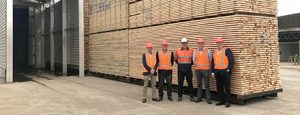If a week is a long time in politics, then 24 hours is an even longer time in a world effectively shut down by COVID-19. There is the occasional trickle of good news, but that is rare. This current crisis comes on the heels of the devastating bushfires during December and January and continuing political uncertainty for the native hardwood sector. Source: Bruce Mitchell
Therefore, it’s probably not asking too much for a tiny piece of certainty in the timber industry, is it?
To be fair there are elements of uncertainty everywhere and affecting everyone. Nobody is immune from that.
But one problem is the somewhat clouded issue of what is deemed an “essential service”, and we are not alone in Australia with that problem.
The US Department of Homeland Security has led the way, identifying the wood products industry as an “essential critical infrastructure workforce” in the nation’s response to the Coronavirus pandemic.
In Canada the situation is a no go for the timber industry. The Forest Products Association of Canada (FPAC) is calling on the federal government to recognize the sector as “essential and critical” during the COVID-19 pandemic with little effect so far.
In New Zealand the timber processing sector is not considered essential although the building industry is. Surely, they go hand-in-hand, but no.
At an industry teleconference on Wednesday, NZ Forestry Minister Shane Jones clarified that the bar for essential services had been set deliberately high by the Government and there would be no stepping back from this in the current environment.
Sawmills and all other producers of wood products including but not limited to Particleboard, plywood, MDF and LVL, all secondary processors of wood products and logging harvesters have all been listed as “non-essential”.
It may be harsh, but at least the industries in those countries know where they stand and can plan accordingly and, so far, the NZ lockdown is expected to last only four weeks.
In Australia, not so, but it’s a grey area. For now, our mills and foresters are going flat out doing important work such as salvaging timber damaged in the fires.
But here’s what Agriculture, Drought and Emergency Minister David Littleproud said on Wednesday.
“Forest Product Industries are regarded as agriculture and primary industry. There hasn’t been anything singling us out as separate from others in terms of essential as yet, but also nothing saying we’re not. Ambiguous I know but that’s what we have.”
So, by default the timber industry is considered “essential” simply because no one has said anything to the contrary.
Victorian Association of Forest Industries CEO Tim Johnston said this week’s enforced closure of “non-essential” businesses has caused considerable uncertainty. He says the most recent advice has been: “Forestry is essential”.
He is working on the theory that any activity not on the government-issued list of non-essential businesses is considered essential until further notice.
The Australian Forest Products Association (AFPA) is urging state and federal governments to recognise the essential services provided by Australia’s forest product industries, as they consider further restrictions to contain COVid-19.
We may not like the answer if the Federal Government is pushed on the matter, but it would be kind of nice to know there we all stand.
Meanwhile, the myriad of industry events that have been postponed or cancelled continues to grow.
The 21st Australian Timber Awards will go ahead because entries are based online. Judging period commences in July, and should we still be under COVID-19 restrictions, judging will be conducted via an online meeting platform. A decision on the awards presentation evening, currently scheduled for mid-October 2020, will be made closer to the date.
And with the Level 4 national lock down in New Zealand the Wood Processors and Manufacturers Association has changed the timing of publicising the winners of the 2020 NZ Wood Resene Timber Design Awards, which had been scheduled for yesterday. Instead, they will be announced next Thursday.
But on an upside, following the devastating bushfires which burnt across more than one third of Kangaroo Island, Boral Timber has donated materials to help build a new wildlife hospital dedicated to conservation. The donated Spotted Gum timber features as the external cladding of the building as well as the decking.
The hospital will help Sam and Dana Mitchell from the Kangaroo Island Wildlife Park to be better equipped in their animal conservation efforts. Since the fires, the couple has rescued almost 600 koalas.
Work well done everyone.






